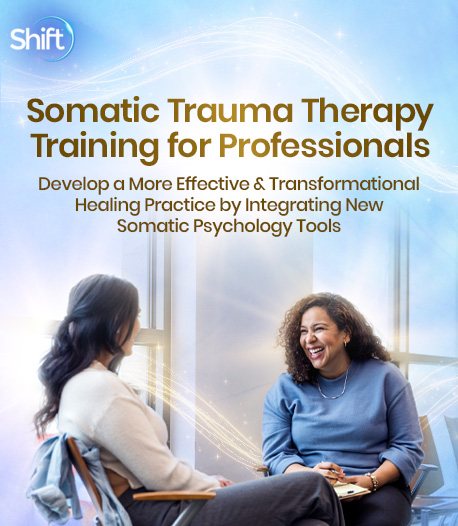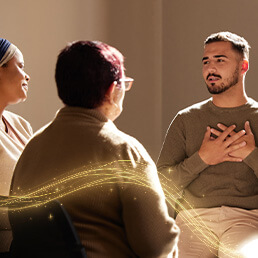

Manuela Mischke-Reeds, MFT
Expand the healing services you provide to your new and existing clients by cultivating an in-depth understanding of your own soma — so you can guide your clients to transform their trauma with somatic psychology, evidence-based clinical approaches, and trauma-informed somatic techniques for self-regulation.
Apply each new somatic psychology tool to your own triggers, projections, transferences, and more — facilitating your inside-out transformation, so you can confidently and safely guide your clients into their full healing potential.
What You’ll Receive | Program Details & Curriculum | About Manuela Mischke-Reeds | Bonus Collection | FAQs

As a practitioner in the fields of psychotherapy, social work, mental health, or wellness coaching, you might sense that your patients’ or clients’ traumatic experiences call for more than conventional interventions.
Trauma survivors rarely possess the spoken language to express the complexity of their pain. Many experts believe the memories stored within their physical bodies tell the real story.
Years ago, these same realizations inspired Manuela Mischke-Reeds, clinical therapist and international somatic psychology teacher, to develop her own therapeutic approach — with the goal of improving her patients’ outcomes.
Manuela began her career 25 years ago, working with survivors of torture.
She realized her clients were often at a loss to verbally convey their trauma — which stayed with them in debilitating forms of flashbacks, night terrors, anxiety, depression, and much more.
Yet, she found that their bodies could express it all.
Manuela focused on learning the body’s expressions and somatic patterns and discovered the body’s innate ability to heal through this powerful silent language.
Now you can learn how to understand this silent language from your clients in Manuela’s breakthrough Somatic Trauma Therapy approach, which acknowledges pathways in which fear and healing coexist in the body.
Her approach draws on various somatic therapy practices that are rooted in polyvagal theory — including key practices from Hakomi Therapy, Somatic Experiencing, and Innate Somatic Intelligence Trauma Therapy.
She’ll show you how to safely use these same somatic resourcing, breathwork, mindfulness, pendulation, and titration skills in your own practice to guide your clients’ transformations and healing...
... from a place of profound compassion — because first, you’ll experience each of these healing tools yourself.
Join us for a 20-module training as Manuela guides you to expand your inner soma toolkit with these Somatic Trauma Therapy skills and techniques.
You’ll first apply each approach to your own life experiences, so you can ultimately bring new dimensions of healing to both your clients — and yourself. Once you learn to regulate your own nervous system, you’re able to effectively navigate systemic trauma issues that may be overwhelming both you and your client.
Manuela will guide you to develop these skills (and many more) so you can become more present with your clients’ suffering, assess which embodiment tools they’ll benefit most from...
... and empower them to trust their own innate somatic intelligence beneath the trauma. You’ll also learn how to best track results so you know when these somatic skills are working.
At the heart of supporting your clients’ journeys towards whole and healthy lives is your own process of facilitating your inside-out transformation as their healer...
... applying Somatic Psychology Tools to your triggers, projections, and countertransferences so you can mediate them when working with clients.
From this grounded space, you can then effectively and compassionately guide your clients into the healing potential they’ve always held in their bodies and hearts.
What You’ll Explore in This 20-Session Professional Training
Overview
Befriend Your Own Healing Process — Experience firsthand why Somatic Therapy work is so essential in healing trauma, as you learn to work with your own trauma and train to apply these practices with clients. Gain an understanding of what it means to cultivate a somatic mindset as an embodied therapist.
Guiding Clients Into the Soma — Help clients experience the integrated embodiment of their entire being, without taking on their trauma yourself. Learn to read your clients’ bodies accurately, and what these body indicators tell you about their influences and internal shaping through different stages of their childhood development.
Somatic Therapy Practices in Each Class — These are rooted in trauma-informed polyvagal theory, plus Hakomi Therapy, Somatic Experiencing, and Innate Somatic Intelligence Trauma Therapy. Learn about somatic resourcing, grounding, co-regulating the nervous system, embodiment, and safe-release technique.
Regular Integration Sessions — Integrate everything you’re learning in small group sessions so that you can develop the skills necessary to apply these tools in your own practice.
Evidence-Based Clinical Approaches & Trauma-Informed Somatic Therapy Techniques
This program focuses on skills-building and experiential practices — you’ll master each technique by first using it on yourself.
Polyvagal-Informed Techniques and Embodiment Tools — Regulate and resource your own nervous system so you can successfully guide your clients into safe embodiment processes
Attention Skills — Cultivate a centered, relational somatic presence to use with your clients
Co-Regulating Tools — Create a safe space for stressed or disconnected clients to help them feel calm as they connect to your nervous system
Early Experience Theory — Understand how core wounds, traumas, and early attachment connections with others are shaped by early experiences (during the ages of 0-3 and 3-6)
Body Reading & Tracking Skills — Identify exactly how the body is communicating, what it tells you about the client, and when somatic tools will be useful
Self-Regulation & Grounding Breath Techniques — Utilize them in your own life so you can then apply them in your client sessions
Assessment Approaches — Identify which embodiment tools your clients will benefit from most, and which will ultimately empower them to trust their own innate somatic intelligence that is beneath the trauma
Results Tracking Skills — Discern when the somatic intervention you chose is working as intended
About This Training Program
You’ll spend 20 modules with Manuela, developing a more effective healing practice as you integrate somatic psychology tools into your own life and in your work with your clients.
This program will feature step-by-step teachings and experiential practices with Manuela. Each session will build harmoniously upon the previous ones, so you’ll develop a complete holistic understanding of the practices, tools, and principles you’ll need to cultivate an in-depth understanding of your own soma as you guide your clients to transform their trauma with somatic psychology.
Program Details & Curriculum
Unit 1: The Embodied Therapist
Your journey to becoming an embodied therapist begins by cultivating your own internal skill set of self-regulation and grounding techniques.
Explore ethical, supportive techniques and practices for bringing these somatic therapy tools you’ve utilized for yourself into your healing practice for others…
… so your clients can ultimately learn to trust themselves and transform their trauma.
Module 1: Lay the Foundation to Heal Your Clients’ Trauma With Overviews of Somatic Psychotherapy & the Polyvagal-Informed Perspective (January 23)

As this course begins, learn what the field of somatic psychology offers you as a practitioner who wants to help your patients heal within a body-oriented framework.
Manuela will explain different approaches within somatic psychology — including lowering the internal noise as opposed to using amplification techniques, and what it means to cultivate a somatic mindset as a therapist.
She’ll share ethical, supportive ways to bring somatic therapy tools into the therapy room, and what it means to learn through the body. You’ll also learn about the polyvagal theory as it applies to somatic therapy work.
In this module, you’ll explore:
- What it means to work somatically
- Maps of embodiment — Somatic Therapy approaches that emphasize a bottom-up-from-the-body approach
- Working within the framework of the Polyvagal-informed theory through a trauma-informed lens — including the different views of somatic therapy’s benefits
- Sensing and feeling as tools for self-discovery
- The value of bringing somatic tools into your practice to ease anxiety and apply them to the work clients have already done
- A brief history of somatics, including the difference between psychotherapy and somatic psychology
- The value of the embodied therapist, the importance of working on yourself, and the inner skill set of how you become embodied — plus how your personal experience with these is necessary in order to lead clients
Module 2: Embody Self-Regulation & Grounding Breath Techniques in Your Own Life So You Can Safely Apply Them With Clients (January 30)

Part of becoming an embodied therapist is cultivating an internal skill set of self-regulation and grounding techniques.
Manuela will guide you in developing a repertoire of ways to skillfully navigate your inner somatic states.
Using these breath techniques helps you learn about your own inner experience so you can apply these with clients.
In this module, you’ll explore:
- Self-regulation techniques so you don’t become overwhelmed with internal triggers while working with patients or clients
- Somatic self-listening skills so you can read your own soma to stay in tune with your own internal needs
- Precise breath practices to create a calm and grounded system
- Sound techniques, including vagal toning, to center yourself through sound
- How to develop a breath practice
Module 3: Embody Self-Regulation With Internal Somatic Therapy Skills to Enhance Your Therapy’s Effectiveness (February 6)

Part of an effective embodiment practice is learning how to sense through your own somatic experience.
You’ll learn where to locate your inner knowing, and how to access wisdom — as you’ll discover, this information doesn’t come from your thinking mind.
Manuela will guide you to practice sensing your body for self-regulation.
In this module, you’ll explore:
- Sensing and feeling techniques for self-regulation to read your internal somatic experience
- Using the tool of internal narrative as a healing resource
- How to develop a somatic sensing and feeling practice through experiential learning
- How sensing can aid the therapy process
Module 4: Techniques for Developing Attention Skills & a Grounded, Relational, Somatic Presence With Your Clients (February 13)

One of the greatest gifts you offer as a therapist or other kind of practitioner is your ability to listen compassionately to your clients’ experiences.
As Manuela will explain, you can cultivate focused attention through mindfulness and somatic practices, enhancing your capacity to be present.
Even in times of trauma when you’re experiencing difficult emotional states, you must find the capacity to be present without distraction or avoidance.
In this module, you’ll explore:
- Techniques for developing attention skills and a grounded, relational somatic presence
- Mindful, compassionate listening techniques to use with your clients
- How to track your tendency to avoid difficult emotional client experiences
- How to notice when clients are emotionally avoiding you as their therapist
- How to focus your mindful attention so you can be present with both yourself and clients
- A guided compassionate listening practice
Module 5: Integration Session to Practice the Essential Skills of an Embodied Therapist (February 20)

In this first integration module, work in a small group to integrate attention and presence.
Practice the key skills of sensing, feeling, and breathing through your soma.
In this module, you’ll:
- Review the key learnings of the embodied therapist
- Further develop and refine skills to apply to your work
- Enjoy a Q&A session with Manuela
Unit 2: Co-Regulating Skills
You’ll build on your somatic psychology skills with more complex techniques, including co-regulating your nervous system with that of a client — with your loving-yet-healthy boundaries firmly in place.
Learn new ways to create safe spaces for clients as they share their most profound experiences, cultivating confidence in your role as a practitioner along the way.
Module 6: Apply Co-Regulating Skills (Part 1) – Create Safe Spaces for Your Clients (February 27)

Learn the skills for co-regulating with your clients or patients.
As Manuela will explain, clarity of mind, heart, and body arises when your boundaries are in place — so you can skillfully work through challenges like transference, countertransference, and projections.
In this module, you’ll:
- Build confidence in your role as a practitioner while maintaining humility and acceptance — so you can create a safe space for clients to share their deepest thoughts and feelings
- Cultivate new attitudes and beliefs about the role of the somatic therapist
- Perform a self-examination into what you specifically bring to your therapy practice
- Acquire techniques to embody the role of therapist — and what’s in the way of you being most effective
- Learn to use the back body practice during a guided experiential exercise to stay grounded in self
Module 7: Apply Co-Regulating Skills (Part 2) — Ease Your Clients’ Overwhelm & Resistance During Sessions (March 5)

The challenges therapists face are immense.
For sessions to be successful, the client must be emotionally and somatically regulated during therapy work.
Learn how overwhelm and resistance are common experiences in therapy — but you can feel prepared with careful co-regulation skills.
An embodied therapist knows her own boundaries and operates from an abundance of somatic connection, supporting her client.
In this module, you’ll:
- Acquire basic co-regulation skills to apply when clients become overwhelmed or resistant
- Identify techniques to transform resistance into curiosity
- Learn to yield to emotional resistance with a Hakomi technique to go with resistance, seeing it as an expression of a core belief that can be worked with
- Experience a guided practice for utilizing somatic techniques to ground your client through co-regulation
Module 8: Establish Safe Relationships With Co-Regulation & Attachment Awareness (March 12)

The need for belonging, safety, and connection are common attachment themes.
Manuela will discuss attachment theory as it applies to somatic work, and how to work with client needs to sensitively and effectively guide them through these core therapeutic themes.
Through guided practices, discover how to work with core beliefs that have interrupted a sense of safety and belonging.
In this module, you’ll:
- View attachment theory from the somatic perspective — developing a framework for why attachment theory is important
- Examine the core need for connection and belonging
- Identify the core beliefs of early attachment so you can understand wounding and belief systems
- Practice using therapeutic interventions to establish safe relationships
Module 9: Lovingly Guide Your Clients Into the Soma Without Taking on Their Trauma (March 26)

Learn techniques for asking the right questions during sessions — and when to ask no questions at all.
How can you help a client discover their inner experience without overthinking things yourself, and getting pulled into their head?
Manuela will guide you through wisdom, techniques, and practices to create this boundary so you can most effectively serve your clients.
In this module, you’ll explore:
- The textures and details of immediate experience — so you can discover the internal organization of your experience by asking “how” questions
- Why guiding into the soma must be done by following clients’ cues, as well as by leading with open inquiry
- Using the Hakomi contact tool to discover what is essential for creating safety and curiosity into the unfolding process
- Practices for tracking the results of the clients’ deepening process
Module 10: Integration Session to Practice the Skills of Co-Regulation (April 2)

Integrate the main techniques of Unit 2 and practice the skill sets you’ve acquired.
Discuss common transference and countertransference issues that surface, and review skills for safely guiding a client into the somatic process.
Review both the sensitivity the clients bring to the topic of attachment, as well as the limits the therapists can face.
In this module, you’ll practice:
- The key learnings of the co-regulating therapist
- Tracking the clients’ themes of attachment needs as core beliefs
- The tool of contacting the present moment
- Applying the skills you’ve learned in small groups
Unit 3: Somatic Body Reading & Development Maps
Delve into increasingly advanced Somatic Psychology skills as you become even more fluent in the secret language of the body (yours and your clients’).
Human development maps help you visualize complex experiences so you can better understand how environment shapes the inner world.
Learn how core wounds and traumas that occur from the ages of 0-3 and 3-6 often lay the foundation for somatic experiences throughout life.
Module 11: Body Reading & Tracking Skills to Identify What the Body Is Communicating (April 9)

The body has its own communication and language.
Manuela will guide you to practice even more precise observation skills. Through the skill of body reading, you’ll identify the unspoken voice the body expresses.
The client often doesn’t know what the body is communicating. The job of the therapist is to help the client connect with their own expressions and meanings.
In this module, you’ll learn:
- Tracking skills, so you can read the body accurately — including what body indicators mean to the client
- The information revealed by body indicators about the internal shaping of the client — including cultural and societal influences from past
- How to create new meaning around your clients’ experiences, without agenda
- Body reading through guided practices
Module 12: Understand How Character Is Shaped by Early Experiences So You Can Support Your Clients More Effectively (April 16)

Character development reflects how people responded to their earliest human developmental challenges.
Everyone is shaped and formed by their environments, learning to make meaning of life within each one of its stages.
Focus on how critical development in utero and during the birthing experience shapes your relationship to self and the world.
Manuela will share maps of somatic therapy work, illustrating the experiential work you’ll be doing into clear ideas and concepts.
In this module, you’ll explore:
- How the body remembers early events and is shaped by them
- The human development map (the first of 3), featuring an overview of human development
- How the soma is shaped by cultural systems — and how it impacts the way people relate to themselves, each other, and the world
- Prenatal and perinatal themes in therapy — how the mother’s pregnancy impacts the psyche and perpetuates intergenerational trauma
- Epigenetics research data, including its influence on 12-14 generations
- How the birthing experience shapes our inner world, impacting the extent to which people feel welcomed or safe in their environments as adults
Module 13: Understanding Life Stage Age 0-3 — Identify the Origins of Core Wounds & Traumas (April 23)

Continue examining how the human development map shapes inner experiences.
Manuela will explain how core wounds and traumas that occur from the ages of 0-3 impact every stage of life going forward.
Learn how the early phases of bonding impact the shaping of core themes — including the need to belong and feel safe.
These core themes are critical to understanding the templates of self-regulation through co-regulation.
In this module, you’ll explore:
- The core beliefs and biological trajectory formed in the age 0-3 developmental stage
- Somatic techniques for working with these early stages
- Somatic practices to address the need for safety, belonging, and connection
- Safety therapeutic considerations at this stage, including belonging, connection, safety, and issues of the first family unit
- A self-touch experiential practice to facilitate self-regulation
Module 14: Examining Life Stage Age 3-6 — The Inner Sense of Connection With Self & Others (April 30)

Examine human development from 3-6 years and its implications in somatic therapy work.
As Manuela will explain, these formative years develop the child’s inner sense of connection with self and others.
Ages 3-6 years shape the personality and temperament a child brings into the family of origin, community, and early schooling years.
Discover how these early imprints of how we learn, need support, are accepted by others, and require both independence and interdependence are all imprinted into the soma.
In this module, you’ll:
- Deeply understand the 3-6 developmental stage
- Learn somatic techniques to support inner child work, blending the frameworks of attachment theory, Jungian Shadow work, Internal Family Systems, and psychodynamic theories
- Explore how inner child states show up somatically, including how how they manifest in therapy
- Recognize body indicators that reveal which interventions may be most effectively applied, using inner child work
- Witness Manuela’s demonstrations of relational techniques using inner child states
Module 15: Integration Session to Apply Somatic Body Reading & Developmental Maps in Your Practice (May 7)

Integrate the somatic body reading and developmental maps segments as you focus on practicing the skills you’ve learned in Unit 3.
Practice body reading and tracking skills to identify what the body is communicating.
Manuela will also review how character is shaped by early experiences as you practice identifying the origins of core wounds and traumas and the earliest connections with self and others.
In this integration session, you’ll:
- Review the human development map as it relates to somatic therapy
- Highlight key learnings from the early core beliefs and how they shape the inner worlds
- Learn from Manuela’s demonstration of working with developmental wounds
- Review and refine your body reading skills
- Enjoy a Q&A session with Manuela to address specifics on Developmental maps.
Unit 4: Somatic Transformation Process
In this final unit, you’ll harness somatic therapy’s full potential for renegotiating and healing traumatic experiences — including your own.
Guide your clients to invite the mind and body to tune into sensations of safety, calm, and goodness.
Support clients as they expand feelings of peace and ease, while sensing and interrupting habitual patterns like anxiety, stress, or fear. But first, apply all these tools to yourself.
Learn to make meaning of your “new” remembered experiences, and help your clients take their new memories and new understandings of themselves out into the world.
Module 16: Recognize the Signs of Change in Your Clients to Help Them Transform Trauma (May 14)

Begin Unit 4 by focusing on transformational moments.
Manuela will explain how you can recognize small and dramatic changes in clients’ perceptions, beliefs, and new habits — and understand how you can use this knowledge to support their growth.
In this module, you’ll explore:
- Skills for tracking your clients’ transformational moments
- Ways to recognize your clients’ progress and make them aware of its implications
- Techniques to facilitate new beliefs — providing safe and mindful explorations so clients can discern their old beliefs and step into new ones
- How to apply homework for clients so they can sustain their new habits
- A practice to help clients facilitate a missing experience from earlier in life, so they can experience it now
Module 17: Polyvagal-Informed Techniques to Help Clients Ground & Stabilize Their Emotional Intensity (May 21)

Manuela will share key aspects of polyvagal-informed techniques for helping your clients feel well-resourced.
Somatic resourcing refers to the ways we strengthen our sense of stability and safety in the world.
Learn how to guide your clients to identify the resources that help them feel secure — including significant people, relationships, skills, strengths, and more — so clients can ground and stabilize their emotional intensity.
The regulated nervous system is important in trauma therapy, as it helps clients stabilize their inner activated states of fight, flight, and freeze responses.
In this module, you’ll explore:
- Somatic resourcing practices to help clients become present for the work, instead of frozen or activated
- Key somatic resource techniques to calm, soothe and settle
- When it’s appropriate to bring somatic resourcing techniques into your sessions (and when it’s not)
- The 3 stages of somatic resourcing: 1) inviting the mind and body to tune into sensations of safety, calm, and goodness, 2) expanding feelings of peace and ease, and 3) intervening (sensing and interrupting habitual patterns like anxiety, stress, or fear)
- A practice to implement the somatic skills of guiding and offering
Module 18: Somatic Therapy Tools to Teach Your Clients to Heal Their Traumatic Memories (May 28)

Somatic therapy is a powerful tool for renegotiating trauma experiences.
Manuela will explain how trauma is stored in the body and not in the event itself, and share tools to transform these traumatic memories.
Learn about nervous system health from the polyvagal theory perspective, so you can teach your clients to transform how they remember their traumatic experiences.
In this module, you’ll explore:
- How trauma is stored in the body
- Common ways to get stuck in responses that are stored as flight-fight-freeze reactions in the nervous system
- Ventral vagal tools to remain relational, connected, and engaged
- A guided vagal-toning technique meditation
Module 19: Somatic Therapy Tools to Help Unfreeze Your Clients’ Nervous Systems So They Can Process Traumatic Experiences (June 4)

Learn how the practical and theoretical elements of polyvagal theory can make your somatic therapy work more effective and compassionate.
Discover what arousal symptoms are and how they impact your clients’ abilities to process trauma.
In this module, you’ll:
- Understand how sympathetic arousal indicators show up in the active parts of the nervous system
- Explore parasympathetic indicators to regulate your clients back into tolerance
- Learn how to track and recognize your clients’ reactions to help them out of the frozen nervous system states during sessions
- Go deeper into your practice and learn more about your body as you break larger movements into smaller segments during a guided micromotion practice
Module 20: Integration Session to Help Clients Embrace Their New Perceptions — As You Bring Your New Somatic Therapy Tools Into Your Practice (June 11)

In this closing integration module, Manuela will prompt you to ask essential questions, including:
How do you make meaning of your new experiences?
How can you help your clients make sense of their new perceptions?
Learn how to develop somatic protocols with clients so they can practice between sessions.
Integrate the personal experiences you’ve had throughout this journey.
In this final integration module, you’ll explore:
- Integration considerations in therapy
- The use of completion rituals in somatic therapy
- The most effective techniques for applying homework assignments and practices with your clients
- Personal integration circles with your fellow participants
What You’ll Receive
-
Twenty 90-Minute Class Sessions With Manuela Mischke-Reeds, MFT
Experience a unique opportunity to learn from Manuela Mischke-Reeds, MFT, somatic trauma therapist and founder of Embodywise — from the comfort of your own home. Each class session includes a streaming video option and will guide you to apply evidence-based clinical approaches, trauma-informed somatic techniques for self-regulation, other best practices, and leading-edge Somatic Trauma Therapy skills. -
Twenty Transcripts of Class Sessions
You’ll also receive the entire class transcript after each session is completed. You can then review, print, and highlight the insights and practices you found most impactful. -
Exercises and Questions for Each Lesson
Between class sessions, you’ll have the option of completing related exercises, practicing new tools, and answering questions to accelerate your learning and integrate each lesson. -
What You’ll Receive | Program Details & Curriculum | About Manuela Mischke-Reeds | Bonus Collection | FAQs
About Manuela Mischke-Reeds, MFT

Manuela Mischke-Reeds, MFT, is a somatic trauma psychotherapist and international teacher of somatic psychology, integrating movement and mindful embodiment tools into her work. She was the co-director of the Hakomi Institute of California, and recently founded Embodywise, a learning community that supports somatic psychology methods that promote wisdom through the body.
She developed an integrative trauma methodology called Innate Somatic Intelligence Trauma Therapy Approach (ISITTA) that focuses on somatic movement and somatic therapy techniques in an in-depth training program for therapists and practitioners.
Manuela has more than 25 years of clinical experience in the field of trauma and somatics, including working with psychedelic-assisted psychotherapy with first responders. She lectures and trains professionals on the topics of mindfulness, somatic psychology, trauma therapy, and compassionate relational approaches to healing.
She has hosted the Hakomi Summit for The Shift Network, and is the author of several books, including 125 Somatic Psychotherapy Tools for Trauma and Stress. and 8 Keys to Practicing Mindfulness: Practical Strategies for Emotional Health and Wellbeing. She will soon be releasing a new book on movement therapy tools for clinicians.
The Somatic Trauma Therapy Training for Professionals Bonus Collection
In addition to Manuela’s transformative 20-module online course, you’ll receive this special bonus collection to complement the course and take your understanding and practice to an even deeper level.
The Hakomi Method Essentials Program ($397 value)
A 10-Module Audio Course With Manuela Mischke-Reeds and Rob Fisher

Are you a healing practitioner, therapist, coach, or spiritual guide looking for ways to expand your skills? In this 10-module audio course, Manuela and Rob Fisher will help you explore Hakomi, the body-mind-heart approach that integrates mindfulness and depth psychology. As you’ll discover, Hakomi blends mindfulness practices with an experience-based somatic approach that holistically meets each client where they are — and enhances your ability to work with them in a deeply relational way.
The Backbody Dyadic Partner Exercise & Practice for Practitioners
Two Audio Teachings + PDF Guide From Manuela Mischke-Reeds

The complexity of trauma symptoms coupled with systemic, collective, and intergenerational traumas requires a multilayered approach to understanding and treating trauma successfully. Manuela’s short audio practices feature somatic resources to ground yourself within your work and relationships. Use them to sharpen your self-regulating capacity in your client sessions and in your everyday life.
What People Are Saying About Manuela Mischke-Reeds, MFT...

— Noreen Buyers Greenblatt: “Manuela Is Wise,
Compassionate, and Uber-Knowledgeable, and
Her Clarity Imbues Her Teaching
With So Much Joy”
“[Manuela] is a powerhouse teacher, facilitator, and therapist.”
Manuela is a powerhouse teacher, facilitator, and therapist. She fully embodies what she teaches and is a much-needed leader in somatics and trauma. I’m so grateful for everything she’s taught me; I find her wildly inspiring.
— Caitlin Clarke, somatic coach
“[Manuela] is a master of her craft.”
In my journey as a therapist, Manuela’s trauma training was essential to developing the skills to support healing in my clients. Manuela is a master of her craft, and with her guidance, I was able to learn to hold a space of safety that allows clients to learn to regulate their nervous system and, in a gentle way, move through and heal their trauma. I consider this one of the most transformative training experiences in my 30 years in the field.
— Giorgio Quittan, LCSW
“[Manuela] has offered me exceptional guidance and support in my skill-building as a licensed clinical psychotherapist and educator.”
I have had the fortunate opportunity to train with Manuela through the Hakomi Institute of California and through her trauma training over the past eight years. Manuela has offered me exceptional guidance and support in my skill-building as a licensed clinical psychotherapist and educator. I have gleaned the skills to navigate trauma work with my clients mainly from her, and I can’t recommend her trainings enough. They offer the theory and practice through embodied exercises and frameworks to really step into the territory of trauma healing with experience and grace. She really teaches you how to work somatically with trauma to transmute from the inside out. Her presence and expertise are a gift to this world.
— Diana Justl, LMFT, faculty at Earth Medicine Center, Oregon
“[Manuela]’s trauma training has been essential in my understanding of trauma.”
Manuela’s trauma training has been essential in my understanding of trauma and my capacity to be at ease with my clients’ trauma responses and offer thoughtful somatic interventions. Taking her training and watching her work, with her 25 years of clinical experience and her deep personal experience with somatic and spiritual practices, has been a gift that keeps on giving.
— Paola Ceccarini, certified Hakomi practitioner
An Unprecedented Opportunity to Join the Online Course, Somatic Trauma Therapy Training for Professionals
We feel honored that Manuela Mischke-Reeds, MFT, has chosen to partner with The Shift Network to offer this exclusive online course. This is a unique opportunity to learn from a somatic trauma therapist, Hakomi trainer, and founder of Embodywise whose powerful insights and pioneering work are helping us heal and awaken ourselves and our world.
If you’re serious about expanding your inner soma toolkit with the Somatic Trauma Therapy skills and techniques, then you owe it to yourself, your loved ones, and our world to take this one-of-a-kind program.
If you’re ready to take the next step in your own evolution, click the register button below to reserve your space now.
Your Satisfaction Is 100% Guaranteed!

Your satisfaction is 100% guaranteed! If you don’t absolutely LOVE Somatic Trauma Therapy Training for Professionals — or don’t feel that it meets your needs — please submit your refund request form 2 weeks from your date of purchase and we’ll happily issue qualifying customers a refund.
Frequently Asked Questions
Q: What is your refund policy?
A: Your satisfaction with The Shift Network and this course is our highest priority! We offer a satisfaction guarantee for a full two weeks so that you can try out the course risk free. The deadline to receive a refund is two weeks from your date of purchase. To request a refund, please click here to submit your Refund Application Form. Your refund will be processed within five business days and we will send you an email confirmation when your refund has been completed. However, we’d love to have a chance to address and resolve your concerns first. If there’s something we can assist you with, please email us at support@theshiftnetwork.com, and we’ll be happy to help!
Q: How can I reach Customer Support?
A: Please visit our Customer Support Center, where you should be able to find the answer to your question or the solution to your problem. And if you can’t, you can submit an online request form and we’ll get right back to you.




